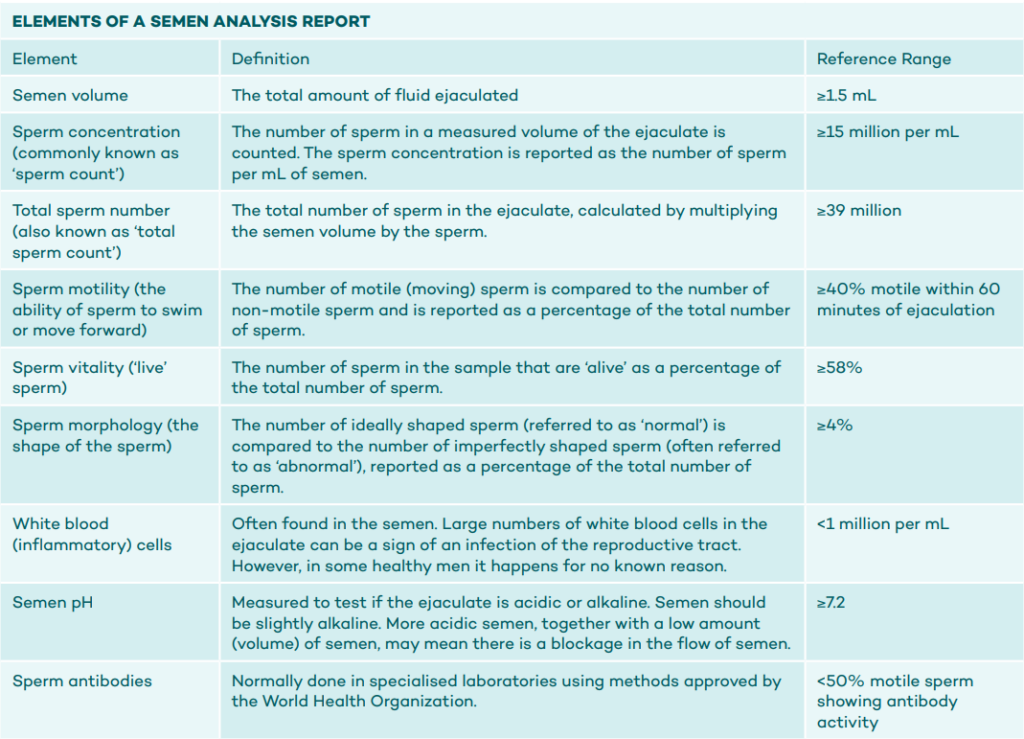If you and your partner have been trying to start a family for more than a year without success, the next step is to have your fertility assessed. The prospect of infertility could make you feel anxious, stressed or angry, and providing a semen sample might also make you feel uncomfortable or embarrassed. That’s normal, but it’s important that you don’t put off the process.
Here we explain what happens when you have your fertility assessed, what the results of a semen analysis mean and how to make the experience as stress-free as possible.
What is male infertility?
Male infertility might be a contributing factor for up to half of infertile couples, but we don’t know for sure.
There is a range of things that can cause male infertility including genetic conditions, abnormal hormonal function, and lifestyle factors. You can read more about the causes of male infertility here.
How is male infertility diagnosed?
If you and your partner haven’t conceived after 12 months of trying, both of you should book appointments with your doctors. A male fertility test will involve a semen analysis at a pathology laboratory. Your doctor will give you a referral to have this done. This involves examination of freshly ejaculated semen under a microscope to determine the number of sperm, their size and shape and their movement.
You might also have a blood test to measure your hormone levels or look for infections, or an ultrasound scan to look at your testes (testicles). In some instances, a biopsy of the testes might be required.
What does a semen analysis involve?
A fresh semen sample is required for analysis, and it’s best collected in a specimen jar by masturbating (without lubricants as many are toxic to sperm). This can be done at the testing laboratory, which has a private room with lockable doors and suitable inspiration for getting the job done. It’s important that none of the semen sample is lost because sperm are mostly in the first part of the ejaculate.
Plenty of men can feel stressed, nervous and awkward about collecting semen. Performance anxiety is normal and if you’re really struggling to produce a sample you can chat to the pathology team about other ways to complete it.
You may be able to produce a sample at home and if masturbation is off the cards, semen can be collected through interrupted intercourse with specialised condom collection devices. Ordinary condoms can’t be used to collect semen for analysis.
When semen is collected at home the sample must be kept warm and taken to the laboratory very quickly, ideally within 30 minutes. You will still need to book an appointment if you are dropping off your sample, so the lab is ready to do the analysis straight away.
How to prepare for a semen analysis
Avoid ejaculating for at least two days before your sample is collected for analysis. On the day of your semen analysis, you need to bring your request form from your GP or fertility specialist into the clinic with you. Discuss any medications you’re taking with your doctor.
What do the results of my semen analysis mean?
Your results will be compared to the World Health Organization’s reference values for fertile men. Even if your results are within the normal reference range, it’s not a guarantee that you’re fertile. And you might still be able to conceive naturally if your results fall outside of the normal range. The results are more of a general guide to your likelihood of fertility.
The quality of your semen can differ day to day and can be affected by illness or infection. At least two semen analyses, at least six weeks apart, are needed to properly check fertility.

What’s DNA fragmentation and do I need to test for that?
If you and your partner have experienced a number of miscarriages or unsuccessful fertility treatments, you might be offered a test to examine DNA fragmentation or damage in your sperm. This damage can lower the chance of sperm making a healthy embryo or baby. This kind of test is not recommended in most professional guidelines because more research is needed before we can be sure they’re useful.
Do at-home sperm testing kits work?
There is a range of at-home fertility tests you can buy online or over the counter. These work by detecting a protein found only in sperm and the test will indicate the concentration of sperm in your semen. Some of the more advanced smartphone-based kits can also evaluate sperm motility. At-home tests do not replace professional fertility testing.
There are a number of factors that affect your fertility and at-home sperm tests do not measure many of them, including shape, vitality, ejaculate volume or exact sperm concentration. They can be a convenient, quick and private first step if you’re evaluating your fertility but further testing should always be done if you’re struggling to conceive.
Listen to Dad Starts Now
A podcast to help men become — and be — the best dads possible
Related articles

A man’s guide to going through IVF
Read article
Alcohol and male fertility: Should men reduce drinking when trying to conceive?
Read article
Are chemicals shrinking your penis and depleting your sperm? Here’s what the evidence really says
Read article











